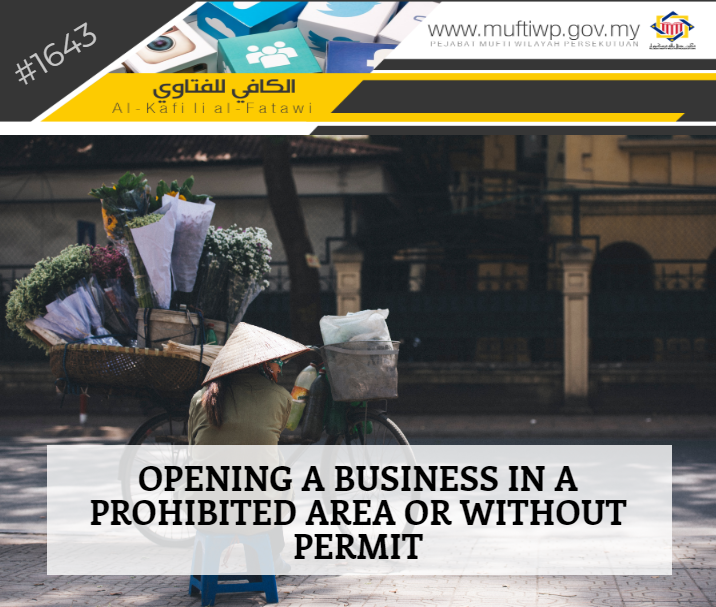Question:
What is the ruling if I open a stall in areas prohibited by local authorities? Or if I open a business at a permissible place, but I do not apply for a permit? Then, is my income considered as halal or haram?
Answer:
Alhamdulillah, praise and thanks to Allah for the countless blessings He has blessed us all with. Blessings and salutations to the Prophet Muhammad PBUH, his wives, his family, companions and all those that follow his teachings to the day of judgement.
The original rule on trade and opening a business is referred back to the original rule in muamalah which is an interaction among humans, that is permissible until there is dalil which prohibits it.
Allah SWT says:
هُوَ الَّذِي جَعَلَ لَكُمُ الْأَرْضَ ذَلُولًا فَامْشُوا فِي مَنَاكِبِهَا وَكُلُوا مِن رِّزْقِهِ ۖ وَإِلَيْهِ النُّشُورُ
It is He who made the earth tame for you - so walk among its slopes and eat of His provision - and to Him is the resurrection.
Surah al-Mulk (15)
An Islamic legal maxim states:
الأصل في المعاملات الإباحة حتى يرد الدليل على خلافه
The original rule of something related to muamalat is its permissibility unless there is dalil that contradicts or prohibits it.
Whereas the hadith of Sai’d bin Zaid which narrates that the Prophet PBUH said:
مَنْ أَحْيَا أَرْضًا مَيِّتَةً فَهِيَ لَهُ وَلَيْسَ لِعِرْقٍ ظَالِمٍ حَقٌّ
"If anyone revives dead land, it belongs to him, and the unjust root has no right."
Sunan Abi Dawud (3073) and Muwatta’ (1430)
This hadith does not imply that a person is permissible to open his business in any location he thinks appropriate. Sheikh Khalil al-Saharanfuri when explaining on this hadith states that ‘a dead land’ in this hadith is understood by the fuqaha’ (jurists) as unclaimed land which is located outside of a particular state or land of no benefit to the state or village. The land that is being developed should first obtain the permission from the ruler, and this is the opinion of Imam Abu Hanifah, Qadhi Abu Yusuf, Imam Malik as stated by Imam al-Syaukani and Imam Mulla Ali al-Qari. (Refer Bazl al-Majhud fi Halli Alfaz Abi Dawud 10/318, Nail al-Autor 6/45 and Mirqat al-Mafatih Syarh Misykat al-Masobih 6/133)
The Context of A Modern Nation
In the context of current citizenship of a modern nation, there are some conditions set by the local authorities upon the sellers and hawkers, among them are:
- It is not allowed for a hawker to open his business at a certain distance from a junction.
- The prohibition of opening business in the areas of staircases or pedestrian walkway
- It is not allowed to open a business in any area which could cause disturbance to the traffic and pedestrian walkway.
These prohibitions are already included under the hadith of the Prophet PBUH which prohibits any form of damage and harm:
لاَ ضَرَرَ وَلاَ ضِرَارَ
"There is no injury nor return of injury."
Sunan Ibn Majah (2341) and al-Muwatta’ (1435)
An Islamic legal maxim states:
الضرر يزال بقدر الإمكان
Harm or hardship is lifted the best possible way
Besides, the concept of taqyid al-mubah is also applied here, in which the ruler reserves the right to limit matters which are originally are permissible, but then are restricted due to maslahah. The Islamic legal maxim states:
تصرف الإمام على الرعية منوط بالمصلحة
Policy and actions from the rulers upon their citizens are bound to the maslahah (and mafsadah)
Imam Ibn Hajar al-Haitami al-Shafi’e said: It is not wajib to obey the command of the ruler (al-hakim) which does not lead to the maslahah ‘ammah (public good). Hence, it is understood through mafhum mukhalafah (converse meaning) that obeying the command of a ruler which contains mashalah ‘ammah is wajib. (Refer Tuhfah al-Muhtaj 3/71)
So, here we emphasize that the income from an unlicensed business or that is opened in the prohibited area by the local authorities is still halal as long as the merchandise is halal, the contract of selling and buying is sahih and does not exhibit any lies or transgressions upon the buyers.
However, obeying the command of the ruler is wajib if it has maslahah, in which, the prohibition of selling in the area is most probably due to the safety measures. The same goes for other worldly laws.
Conclusion
In short, we state that disobeying the command of the government in terms of not applying for a license or opening a business in the prohibited location will not affect the income in term of its status, but it leads to sin in another aspect, like a safety threat, injustice towards other sellers who applied for license and etc.


